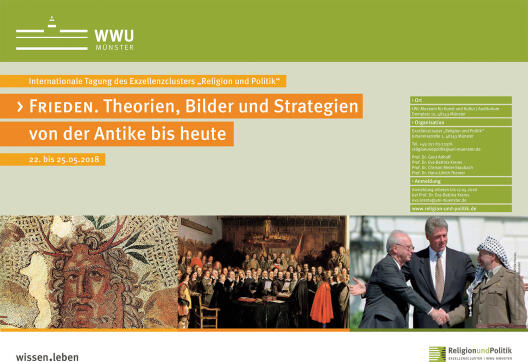“PEACE. Theories, Images and Strategies from Antiquity to the Present Day”
International Conference of the Cluster of Excellence held in Münster from 22 to 25 May 2018

At the public conference “PEACE. Theories, Images and Strategies from Antiquity to the Present Day” of the University of Münster’s Cluster of Excellence, which will be held from 22 to 25 May 2018 in Münster, internationally renowned researchers will address the question of why people throughout the ages wanted peace, but never succeeded in securing it in the long term. On the basis of many historical examples of European history, they discuss strategies, behavioural patterns and processes with which people from antiquity to the present day have tried to establish and maintain peace. The researchers focus on how many of the images, rituals and strategies have remained valid over time. At the same time, they show changes typical of their time and their causes. Those who are interested are invited to attend.
In 21 lectures, researchers from history, archaeology, art history, German philology and philosophy offer exemplary explorations of different aspects of peace issues which, together, structure the multifaceted history of establishing and securing peace and thus also aim to draw attention to the continuity and change of institutions, ideas and strategies. The conference is organised by historian Prof. Dr Gerd Althoff, art historian Prof. Dr Eva-Bettina Krems, philologist Prof. Dr Christel Meier-Staubach, and historian Prof. Dr Hans-Ulrich Thamer, all from the Cluster of Excellence.
The conference is part of the exhibition “Peace. From Antiquity to the Present Day”, which will present the topics in a variety of exhibits at five locations in the city of the Peace of Westphalia from 28 April to 2 September 2018. The idea and basic concept of the exhibition project are the result of the many years of research at the Cluster of Excellence “Religion and Politics” on the topic of peace.
Historian Prof. Dr Gerd Althoff will talk about the building of trust and the history of an elementary strategy of peace-building (Vertrauensbildung. Zur Geschichte einer elementaren Strategie der Friedensherstellung) in the opening lecture on 22 May at 7 pm. In the public evening lecture on 24 May at 8.15 pm, Prof. Dr Christoph Kampmann, historian of the early modern period from Marburg, will deal with peace norms and security policies, using the example of the Peace of Westphalia to illustrate basic problems of the establishment of peace in the early modern period (Friedensnorm und Sicherheitspolitik: Grundprobleme frühneuzeitlicher Friedensstiftung am Beispiel des Westfälischen Friedens). All lectures are open to the public and will be held in the auditorium of LWL-Museum für Kunst und Kultur at Domplatz 10 in Münster. (asc/vvm)

